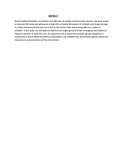Participation in a mobile health intervention to improve retention in early HIV care in an informal urban settlement in Nairobi, Kenya: a gender analysis
| dc.contributor.author | Kop, M. van der | |
| dc.contributor.author | Ojakaa, D | |
| dc.contributor.author | Ekström, A | |
| dc.contributor.author | Kimani, J | |
| dc.contributor.author | Thabane, L | |
| dc.contributor.author | Awiti-Ujiji, O | |
| dc.contributor.author | Lester, R | |
| dc.date.accessioned | 2015-03-13T07:07:58Z | |
| dc.date.available | 2015-03-13T07:07:58Z | |
| dc.date.issued | 2015 | |
| dc.identifier.uri | http://hdl.handle.net/11295/81208 | |
| dc.description.abstract | Mobile health (mHealth), the delivery of healthcare via mobile communication devices, has been shown to improve HIV treatment adherence in East Africa. Despite the growth of mHealth and the gender gap in mobile phone ownership and use in Africa, few studies have examined gender as it relates to mHealth. In this study, we will examine data from an ongoing trial of a text-messaging intervention to improve retention in early HIV care. Our objectives are to determine whether gender disparities in mobile phone access affect the ability to participate in an mHealth trial, and whether gender influences responses to and perceptions of the intervention. | en_US |
| dc.language.iso | en | en_US |
| dc.publisher | University of Nairobi | en_US |
| dc.title | Participation in a mobile health intervention to improve retention in early HIV care in an informal urban settlement in Nairobi, Kenya: a gender analysis | en_US |
| dc.type | Article | en_US |
| dc.type.material | en | en_US |
Files in this item
This item appears in the following Collection(s)
-
Faculty of Health Sciences (FHS) [10387]

